After eight rounds on the Isle of Man Grand Swiss, there are now three players in the lead. The leaders after round seven, Fabiano Caruana and Levon Aronian drew their games, maintaining the top positions. As of round eight, they are joined by David Anton Guijarro, who defeated Alexander Grischuk after an excellently executed opening preparation, throwing his opponent into trouble from the very start. The second tier consists of 10 players who are on 5.5/8, which includes the World Champion Magnus Carlsen and Wang Hao of China who split a point in round eight. The highlight of the day, however, was on boards seven and eight where identical games were played until move 19, which drew a lot of attention from both other players and the public but also raised some questions for the arbiters.
On board one Levon Aronian – who, with a late start, sprang up to the top in round seven – shared a point with the player who has been at the top from the very start, World No 2, Fabiano Caruana. In a balanced position, with the queens exchanged, White (Caruana) pushed the g-pawn in front of his king’s castle in an attempt to break a pesky f5-e4 pawn formation which threatened to develop into a dangerous advance for Black. Aronian responded with g7-g6, protecting the chain. This led to a series of exchanges in which Black planted his pawn on e3, pinning white’s e2-pawn. White secured a 2:1 pawn advantage on the queenside and then both sides wanted to take their chances: black to promote his e3-pawn, white to push his queenside runners, but the game was mostly even. The two players eventually agreed to a draw, not wanting to go for too much, but, also, probably having realized seen that most of the other top games had finished and that there was only one other player joining them at the top.
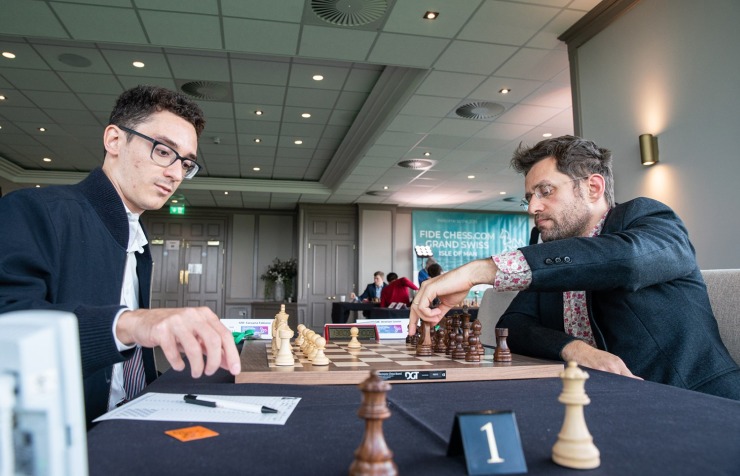
The first game of the day to finish was an encounter between Wang Hao of China and World Champion Magnus Carlsen. After an hour and 15 minutes of play and 31 moves, the game ended in a draw. Wang decided to play an opening which resulted early on in the exchange of queens and a pair of bishops, quickly ending in an equal position. Carlsen was clearly disappointed – not with the position, but with the fact that his opponent played for a draw and forced a situation on the board in which he could maintain equality easily. After the game, Wang Hao told that he intentionally went for a draw as he was exhausted from the two previous games (round six where he managed to turn the tables on Luke McShane after more than six and a half hours of play, and the torturous round seven defeat to Levon Aronian).
“El niño” Anton joins the leaders
The game between David Anton and Candidates’ hopeful Alexander Grischuk brought more excitement than the top two boards but ended badly for the Russian. A somewhat unusual position developed in the first ten moves, with key action happening on the kingside where both white and black had to sacrifice their knights.
Anton did not waste much time in the opening, demonstrating his clearly excellent preparation – for which he thanked his coach, David Martinez. On the other hand, Grischuk – who is known for entering into time trouble – was carefully assessing his moves but gradually moving into a dangerous zone. By move 16 there was a sharp position on the board with White having his queen centralized on d5, his rook on f4 and pieces ready for an active assault, while Black had most of his pieces on the back ranks. Instead of going for the exchange of queens, Grischuk pushed his f-pawn to the fifth rank, further exposing the king. White then offered a bishop sacrifice which Grischuk took, but from that moment on he was completely lost. At one point the situation was so dire that White could choose whether to take an extra rook or go for the king. Desperately low on time, 16 moves before the first control, Grischuk resigned. This win catapulted the Spaniard to the top of the rankings. With six points out of eight, he shares the top position with Fabiano Caruana and Levon Aronian. With five out of eight, Grischuk is now in the third tier of competitors.
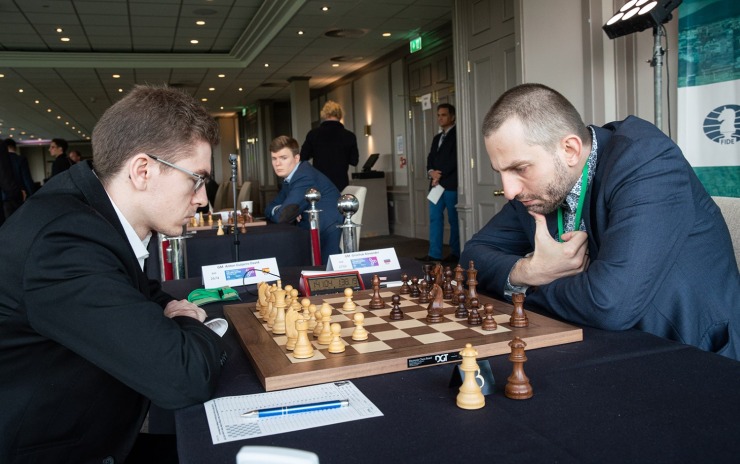
On board four Junior World Champion Parham Maghsoodloo was playing the Russian 2700-heavyweight Nikita Vitiugov. In an even position, after 23 moves, the two agreed to draw. With 5.5 out of 8 both players are still among the top 13, and with three more rounds to go still have strong chances to win the tournament.
Wesley So had another (altogether, sixth) draw of the tournament, this time with Russian GM Kirill Alekseenko. After the cautious play by both sides, they ended with a bishop and knight and six pawns each in an even endgame, without chances of either side breaking through.
A good day for Anand
The eighth day at the Isle of Man Grand Swiss was a good day for Vishy Anand who was facing Vladimir Fedoseev. Anand, who was playing as white, immediately went on the offensive: by move 11 all of his pieces were developed and aiming for a kingside attack. One of the key moments of the game came when Anand played g4, launching an attack on the black’s kingside but at some point, after black had castled white lost momentum. Anand made an error, going for an exchange on the e-file and allowing the black rook on f8 to take command of the important f-file.
The position was even, according to the computer, but Anand wanted to win: he pushed his remaining kingside pawns forward. Black tried to retaliate with bishop threats against white’s king, but Anand fended them off. By move 33 the Indian had black’s back ranks dangerously disturbed by a rook on c8 and the queen on h3, holding the h3-c8 diagonal under control. Fedoseev made the decisive blunder on the move 35 when he pushed his last remaining kingside pawn to h5, opening himself to deadly threats from Anand. Two moves later, facing either checkmate or exchange of queens leading to a completely lost position, black resigned. Anand is now on 5.5 out of eight and, after a surprise defeat in round one, has shown that – at the age of almost 50 – he has the discipline, resilience, and will-power to come back and march steadily towards the top.
Accidental game twins
The most unique situation of the day occurred on boards seven and eight where, for well over an hour and a half, an identical position was played in both games! On board seven Alexei Shirov was playing against Yu Yangyi of China, while on board eight Sergey Karjakin was facing Aleksey Dreev. The two games unfolded identically until black’s 19th move, including the same mistake by Black on move 18! This development drew a lot of attention from the other players who were chuckling and exchanging looks. The four players on the board did not seem to have initially paid much attention to this. However, eventually, they could not help but look to the other board, although – in the case of Yu Yangyi – he seemed on a few occasions to be desperately trying not to do so.
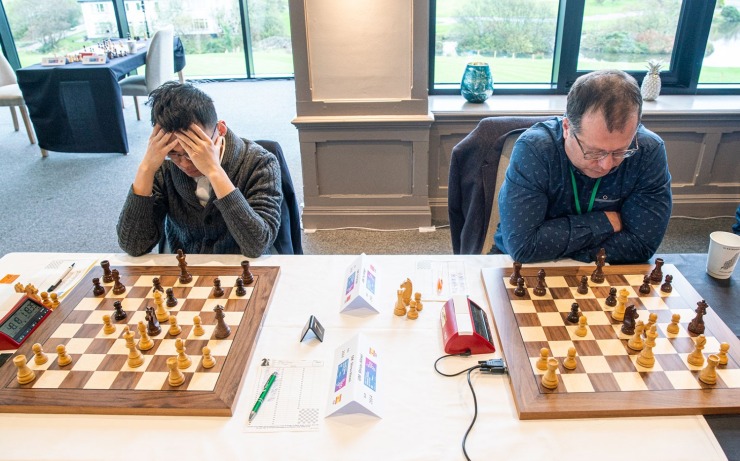
The situation caught the eye of the arbiters who, after noticing that the players are starting to get distracted by the attention around them as well as with the other (identical) game, decided to move one pair to the second playing hall. As the chief arbiter Alexander Holowczak and Fair Play officer Andy Howie noted, there was no suspicion of foul play at any moment (see the addition at the end of the article).
The game which was moved to the other playing hall was that of Shirov and Yu. Unlike his accidental position-twin, Aleksey Dreev, who could not find a way out of a mistake in move 18 and eventually lost, the Chinese GM Yu Yangyi was more efficient. Yu defended well and drew with Shirov after 44 moves. With this win against Dreev, Sergey Karjakin remains a contender for the top place.
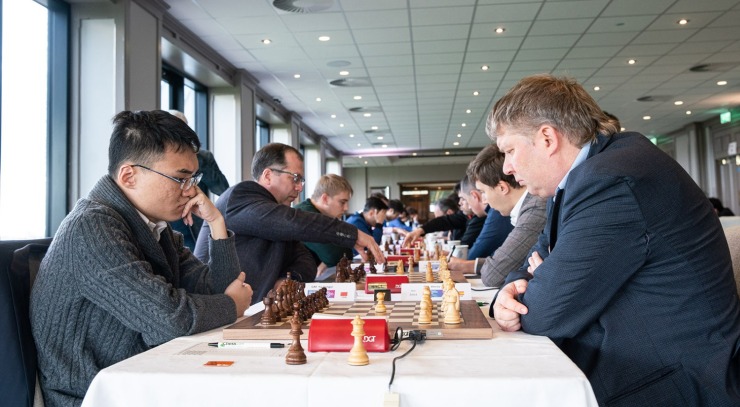
Nakamura keeps up the pace as Wojtaszek crumbles
On board nine, last year’s Isle of Man winner, Radoslaw Wojtaszek lost as white to Vladislav Kovalev of Belarus. With 4.5 out of eight, Wojtaszek is in the middle and almost certainly he will not be able to repeat last year’s success. Playing on board ten, Hikaru Nakamura scored a victory against Armenia’s Hrant Melkumyan and with 5.5 points he is still in the second tier of players who have strong chances of emerging at the top.
Finally, on board 11, Boris Gelfand had a very comfortable position as white throughout the game against Zhong Zhang of China, forcing his opponent to try with a desperate sacrifice of material at the end, but to no avail. Gelfand was the last one to join the second tier of players with 5.5 (there are 12 of them).
Grischuk (after a loss), Shirov and Yu Yangyi (after a draw) are now in the third tier with 5/8, where they are joined by such heavyweights as Wesley So, Luke McShane, Peter Svidler, David Howell, and Jeffery Xiong.
Top two women on 50 percent
Among women players, the best performers after eight rounds are Dinara Saduakassova who drew as black with Alexander Motylev, and Swaminathan Soumya, who won against Zahar Efimenko, who is higher rated by 240! Both female players are now at 50 percent.
The Chief Arbiter Alexander Holowczak about his decision in the ‘identical games’ case:
“No suspicion of foul play, we just didn’t want the players distracted”
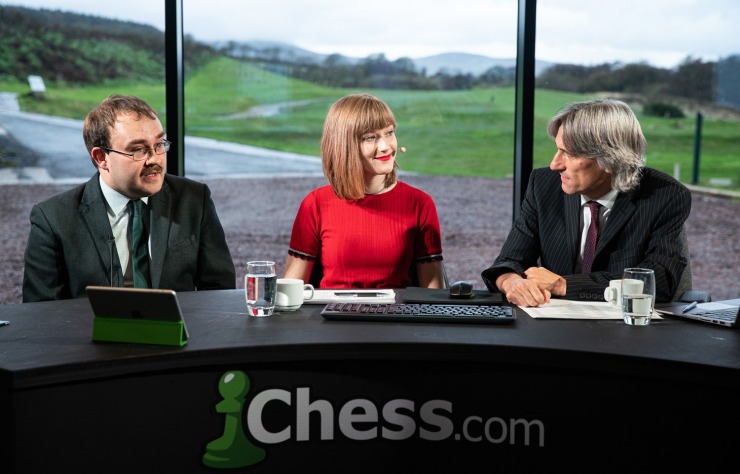
Q: Why did you make a decision to move one game to a different playing hall?
The position on the boards was identical. Whilst we did not think that any improprieties were going on, it was very noticeable that the players were starting to get distracted by those around them. As Dreev made his 19th move, Yangyi looked over but immediately then looked in the other direction. I felt the players were getting distracted and, almosts compromised in the moves they felt they could make, so it seemed logical to me to move them to a spare board.
Q: How did you decide to move Shirov and Yu Yangyi, instead of Karjakin and Dreev?
Because Shirov’s opponent was the second person to make the move, as Dreev already played the same move, it made sense.
Q: After they were moved, the four players did not go and check each other’s games. But, have they wished to do so, would you have allowed it?
The reason why we moved them was to help the players avoid any accusations that they’ve copied each other’s move. I, therefore, think that have the players then went to check the other game, it would have looked suspicious. They were self-aware of the situation and that there was no need for me to tell them anything.
Sergey Karjakin: I was actively looking at the other position!
Speaking to FIDE press officer immediately after the game, Sergey Karjakin said:
– It was impossible not to notice that the position was the same. Our boards were next to each other and we were looking at the position the whole time. Even Alexei [Shirov] told me that the situation led him to change his preparation, but after Yu Yangyi made some moves, he decided to follow my suit.
Q: What was your reaction when the arbiter approached your boards?
– We were fine with this. Such situations happen in chess. I would have preferred for it to have continued like it was, but it’s up to the arbiters to decide. I would have been very unhappy if, for example, if Yu Yuyangyi had found a forced line to a draw and for Dreev to repeat it, but at the same time – it’s chess and some fun things should happen sometime.
Q: Were you actively trying not to look at the other board?
– On the contrary, I was actively and intently looking at the other board!
Text: Milan Dinic
Photos: Maria Emelianova/Chess.com and John Saunders
IOM International Chess Limited:
Tournament Director Alan Ormsby
masters@iominternationalchess.com
+44 7624 453200
Chess.com:
Director of Esports and Events Nick Barton
nick@chess.com
+1 8326223010
FIDE:
Chief Communications Officer David Llada
press@fide.com
+34 680312625








